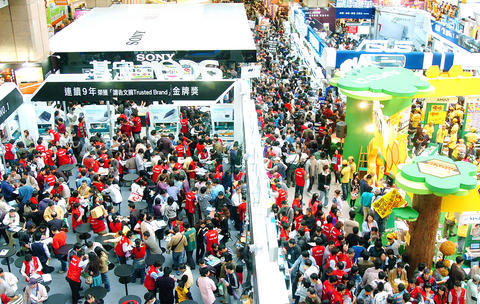Crowds packed IT Month yesterday in search of good deals on the annual year-end information technology fair's closing day.
The Taipei session of the expo attracted twice as many visitors on its last day as attended the show on weekdays, the organizers said, adding that consumers had shown keen interest in spending on electronics devices despite concerns about the economy.
The exhibition, which will continue in other cities until Jan. 15, drew around 150,000 people to the World Trade Center yesterday to scour the 650 booths manned by electronics makers, pushing the total number of visitors during the nine-day fair to 750,000 people and edging close to the venue's limit for visitors at a single time, the Taipei Computer Association (TCA, 台北市電腦公會) said.

PHOTO: CHU PEI-HSIUNG, TAIPEI TIMES
"Strong buying sentiment indicated that local consumers were not affected by the slowing macroeconomic environment," TCA said in a statement released yesterday, easing concerns about slowing consumption as inflation threatens to continue.
Notebook computer vendors came out strong at the event, the TCA said.
One laptop salesperson at the expo reported selling at least 130 laptops per day, the TCA said.
Hewlett Packard Co said unit sales expanded 30 percent from last year, while Acer Inc posted a 50 percent growth.
Local computer maker Asustek Computer Inc's (
The company sold all 5,000 Eee PCs it had stocked for the show and was surprised by the strong interest from average consumers.
"We sold an Eee PC every two minutes," the computer maker said.
"The sale of Eee PCs has expanded the PC market, targeting general consumers. This surprised us," Benson Lin (
The Republic of the Gambia also ordered an unspecified number of Eee PCs after Gambian President Alhaji Yahya Jammeh visited Asustek's booth at the fair last week.
Overall, sales grew around 35 percent annually to exceed the revenues goal of NT$400 million, Asustek marketing division vice president Kevin Lin (
The average selling price rose NT$5,000 from NT$35,000 last year despite the PC sector's overall downward-trend in prices, Lin said.
The organizer said that laptop computers, digital cameras and liquid-crystal-display (LCD) monitors were the top three targets for consumers.
Subscriptions for high-speed 3.5-generation (3.5G) data cards allowing users to connect laptops to the Internet wirelessly also grew significantly, TCA said.
Unit sales of digital cameras leapt 30 percent because of replacement demand and the launch of new models, the organizer said, citing exhibitors' sales figures.
The annual IT Month show will open to the public in Taichung from Friday to the following Wednesday and then continue to Tainan and Kaohsiung through Jan. 15, the organizer said.

MULTIFACETED: A task force has analyzed possible scenarios and created responses to assist domestic industries in dealing with US tariffs, the economics minister said The Executive Yuan is tomorrow to announce countermeasures to US President Donald Trump’s planned reciprocal tariffs, although the details of the plan would not be made public until Monday next week, Minister of Economic Affairs J.W. Kuo (郭智輝) said yesterday. The Cabinet established an economic and trade task force in November last year to deal with US trade and tariff related issues, Kuo told reporters outside the legislature in Taipei. The task force has been analyzing and evaluating all kinds of scenarios to identify suitable responses and determine how best to assist domestic industries in managing the effects of Trump’s tariffs, he

TIGHT-LIPPED: UMC said it had no merger plans at the moment, after Nikkei Asia reported that the firm and GlobalFoundries were considering restarting merger talks United Microelectronics Corp (UMC, 聯電), the world’s No. 4 contract chipmaker, yesterday launched a new US$5 billion 12-inch chip factory in Singapore as part of its latest effort to diversify its manufacturing footprint amid growing geopolitical risks. The new factory, adjacent to UMC’s existing Singapore fab in the Pasir Res Wafer Fab Park, is scheduled to enter volume production next year, utilizing mature 22-nanometer and 28-nanometer process technologies, UMC said in a statement. The company plans to invest US$5 billion during the first phase of the new fab, which would have an installed capacity of 30,000 12-inch wafers per month, it said. The

Taiwan’s official purchasing managers’ index (PMI) last month rose 0.2 percentage points to 54.2, in a second consecutive month of expansion, thanks to front-loading demand intended to avoid potential US tariff hikes, the Chung-Hua Institution for Economic Research (CIER, 中華經濟研究院) said yesterday. While short-term demand appeared robust, uncertainties rose due to US President Donald Trump’s unpredictable trade policy, CIER president Lien Hsien-ming (連賢明) told a news conference in Taipei. Taiwan’s economy this year would be characterized by high-level fluctuations and the volatility would be wilder than most expect, Lien said Demand for electronics, particularly semiconductors, continues to benefit from US technology giants’ effort

‘SWASTICAR’: Tesla CEO Elon Musk’s close association with Donald Trump has prompted opponents to brand him a ‘Nazi’ and resulted in a dramatic drop in sales Demonstrators descended on Tesla Inc dealerships across the US, and in Europe and Canada on Saturday to protest company chief Elon Musk, who has amassed extraordinary power as a top adviser to US President Donald Trump. Waving signs with messages such as “Musk is stealing our money” and “Reclaim our country,” the protests largely took place peacefully following fiery episodes of vandalism on Tesla vehicles, dealerships and other facilities in recent weeks that US officials have denounced as terrorism. Hundreds rallied on Saturday outside the Tesla dealership in Manhattan. Some blasted Musk, the world’s richest man, while others demanded the shuttering of his